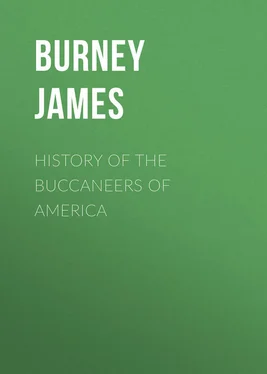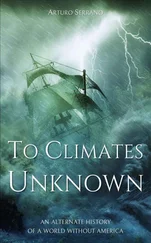James Burney - History of the Buccaneers of America
Здесь есть возможность читать онлайн «James Burney - History of the Buccaneers of America» — ознакомительный отрывок электронной книги совершенно бесплатно, а после прочтения отрывка купить полную версию. В некоторых случаях можно слушать аудио, скачать через торрент в формате fb2 и присутствует краткое содержание. Жанр: foreign_antique, foreign_prose, на английском языке. Описание произведения, (предисловие) а так же отзывы посетителей доступны на портале библиотеки ЛибКат.
- Название:History of the Buccaneers of America
- Автор:
- Жанр:
- Год:неизвестен
- ISBN:нет данных
- Рейтинг книги:4 / 5. Голосов: 1
-
Избранное:Добавить в избранное
- Отзывы:
-
Ваша оценка:
- 80
- 1
- 2
- 3
- 4
- 5
History of the Buccaneers of America: краткое содержание, описание и аннотация
Предлагаем к чтению аннотацию, описание, краткое содержание или предисловие (зависит от того, что написал сам автор книги «History of the Buccaneers of America»). Если вы не нашли необходимую информацию о книге — напишите в комментариях, мы постараемся отыскать её.
History of the Buccaneers of America — читать онлайн ознакомительный отрывок
Ниже представлен текст книги, разбитый по страницам. Система сохранения места последней прочитанной страницы, позволяет с удобством читать онлайн бесплатно книгу «History of the Buccaneers of America», без необходимости каждый раз заново искать на чём Вы остановились. Поставьте закладку, и сможете в любой момент перейти на страницу, на которой закончили чтение.
Интервал:
Закладка:
Bart. de las Casas, and Cardinal Ximenes; their endeavours to serve the Indians. The Cardinal dies. The endeavours of the Dominican Friars in behalf of the natives were seconded by the Licentiate Bartolomeo de las Casas, and by Cardinal Ximenes when he became Prime Minister of Spain ; and, to their great honour, they were both resolute to exert all their power to preserve the natives of America . The Cardinal sent Commissioners, and with them las Casas, with the title of Protector of the Indians. But the Cardinal died in 1517; after which all the exertions of las Casas and the Dominicans could not shake the repartimientos .
1519. At length, among the native Islanders there sprung up one who had the courage to put himself at the head of a number of his countrymen, and the address to withdraw with them from the gripe of the Spaniards, and to find refuge among the mountains. Cacique Henriquez. This man was the son, and, according to the laws of inheritance, should have been the successor, of one of the principal Caciques. He had been christened by the name of Henriquez, and, in consequence of a regulation made by the late Queen Ysabel of Castile , he had been educated, on account of his former rank, in a Convent of the Franciscans. He defended his retreat in the mountains by skilful management and resolute conduct, and had the good fortune in the commencement to defeat some parties of Spanish troops sent against him, which encouraged more of his countrymen, and as many of the Africans as could escape, to flock to him; and under his government, as of a sovereign prince, they withstood the attempts of the Spaniards to subdue them. Fortunately for Henriquez and his followers, the conquest and settlement of Cuba , and the invasion of Mexico , which was begun at this time, lessened the strength of the Spaniards in Hispaniola , and enabled the insurgents for many years to keep all the Spanish settlements in the Island in continual alarm, and to maintain their own independence.
During this time, the question of the propriety of keeping the Islanders in slavery, underwent grave examinations. It is related that the experiment was tried, of allowing a number of the natives to build themselves two villages, to live in them according to their own customs and liking; and that the result was, they were found to be so improvident, and so utterly unable to take care of themselves, that the encomiendas were pronounced to be necessary for their preservation. Such an experiment is a mockery. Before the conquest, and now under Don Henriquez, the people of Hayti shewed they wanted not the Spaniards to take care of them.
CHAPTER III
1518. Adventure of an English Ship. In the year 1517 or 1518, some Spaniards in a caravela going from St. Domingo to the Island Porto Rico , to take in a lading of cassava, were surprised at seeing a ship there of about 250 tons, armed with cannon, which did not appear to belong to the Spanish nation; and on sending a boat to make enquiry, she was found to be English. The account given by the English Commander was, that two ships had sailed from England in company, with the intention to discover the country of the Great Cham; that they were soon separated from each other by a tempest, and that this ship was afterwards in a sea almost covered with ice; that thence she had sailed southward to Brasil , and, after various adventures, had found the way to Porto Rico . This same English ship, being provided with merchandise, went afterwards to Hispaniola , and anchored near the entrance of the port of San Domingo , where the Captain sent on shore to demand leave to sell their goods. The demand was forwarded to the Audiencia , or superior court in San Domingo ; but the Castellana, or Governor of the Castle, Francisco de Tapia, could not endure with patience to see a ship of another nation in that part of the world, and, without waiting for the determination of the Audiencia , ordered the cannon of the fort to be fired against her; on which she took up her anchor and returned to Porto Rico , where she purchased provisions, paying for what she got with wrought iron, and afterwards departed for Europe 3 3 Historia General de las Indias , por Gonç. Hernandez de Oviedo , lib. 19. cap. 13. Also Hakluyt , vol. iii. p. 499, edit. 1600.
. When this visit of an English ship to the West Indies was known in Spain , it caused there great inquietude; and the Governor of the Castle of San Domingo , it is said, was much blamed, because he had not, instead of forcing the ship to depart by firing his cannon, contrived to seize her, so that no one might have returned to teach others of their nation the route to the Spanish Indies.
The French and other Europeans resort to the West Indies; The English were not the only people of whom the Spaniards had cause to be jealous, nor those from whom the most mischief was to be apprehended. The French, as already noticed, had very early made expeditions to Brasil , and they now began to look at the West Indies ; so that in a short time the sight of other European ships than those of Spain became no novelty there. Hakluyt mentions a Thomas Tyson, an Englishman, who went to the West Indies in 1526, as factor to some English merchants. Are regarded as Interlopers by the Spaniards. 1529. Regulation proposed by the Government in Hispaniola, for protection against Pirates. When the Spaniards met any of these intruders, if able to master them, they made prisoners of them, and many they treated as pirates. The new comers soon began to retaliate. In 1529, the Governor and Council at San Domingo drew up the plan of a regulation for the security of their ships against the increasing dangers from pirates in the West Indies . In this, they recommended, that a central port of commerce should be established in the West Indies , to which every ship from Spain should be obliged to go first, as to a general rendezvous, and thence be dispatched, as might suit circumstances, to her farther destination; also, that all their ships homeward bound, from whatsoever part of the West Indies , should first rendezvous at the same port; by which regulation their ships, both outward and homeward bound, would form escorts to each other, and have the benefit of mutual support; and they proposed that some port in Hispaniola should be appointed for the purpose, as most conveniently situated. This plan appears to have been approved by the Council of the Indies ; but, from indolence, or some other cause, no farther measures were taken for its adoption.
The attention of the Spaniards was at this time almost wholly engrossed by the conquest and plunder of the American Continent, which it might have been supposed would have sufficed them, according to the opinion of Francisco Preciado, a Spanish discoverer, who observed, that there was country enough to conquer for a thousand years . The continental pursuits caused much diminution in the importance of the West India Islands to the Spaniards. The mines of the Islands were not comparable in richness with those of the Continent, and, for want of labourers, many were left unworked. Hunting of Cattle in Hispaniola. The colonists in Hispaniola , however, had applied themselves to the cultivation of the sugar-cane, and to manufacture sugar; also to hunting cattle, which was found a profitable employment, the skins and the suet turning to good account. Matadores. The Spaniards denominated their hunters Matadores, which in the Spanish language signifies killers or slaughterers.
Читать дальшеИнтервал:
Закладка:
Похожие книги на «History of the Buccaneers of America»
Представляем Вашему вниманию похожие книги на «History of the Buccaneers of America» списком для выбора. Мы отобрали схожую по названию и смыслу литературу в надежде предоставить читателям больше вариантов отыскать новые, интересные, ещё непрочитанные произведения.
Обсуждение, отзывы о книге «History of the Buccaneers of America» и просто собственные мнения читателей. Оставьте ваши комментарии, напишите, что Вы думаете о произведении, его смысле или главных героях. Укажите что конкретно понравилось, а что нет, и почему Вы так считаете.












